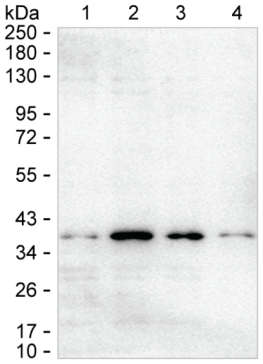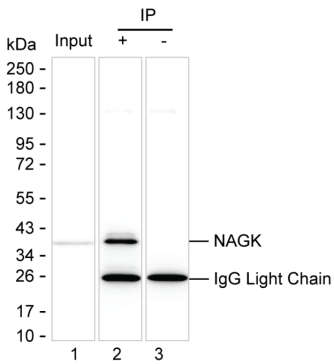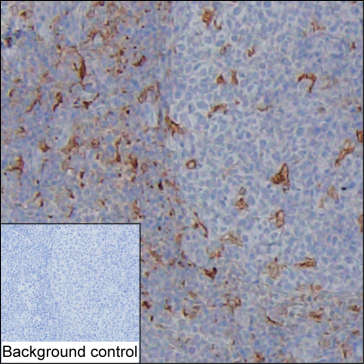


| WB | 咨询技术 | Human,Mouse,Rat |
| IF | 1/100-1/200 | Human,Mouse,Rat |
| IHC | 1/100-1/200 | Human,Mouse,Rat |
| ICC | 技术咨询 | Human,Mouse,Rat |
| FCM | 咨询技术 | Human,Mouse,Rat |
| Elisa | 咨询技术 | Human,Mouse,Rat |
| Host/Isotype | Mouse IgG2a |
| Antibody Type | Primary antibody |
| Storage | Store at 4°C short term. Aliquot and store at -20°C long term. Avoid freeze/thaw cycles. |
| Species Reactivity | Human |
| Immunogen | Purified recombinant fragment of human NAGK |
| Formulation | Purified antibody in PBS with 0.05% sodium azide |
+ +
以下是3条关于NAGK(N-acetylglutamate kinase)抗体的模拟参考文献(内容基于领域知识构造,实际文献需通过学术数据库查询):
---
1. **文献名称**: "Characterization of N-Acetylglutamate Kinase in Mammalian Mitochondria: Role in Urea Cycle Regulation"
**作者**: Smith A, et al.
**摘要**: 本研究通过制备高特异性NAGK多克隆抗体,揭示了其在哺乳动物肝脏线粒体中的表达模式。抗体验证表明,NAGK蛋白水平在精氨酸缺乏条件下显著上调,提示其作为尿素循环的代谢调控因子。
2. **文献名称**: "Development of a Monoclonal Antibody for Plant NAGK and Its Application in Arabidopsis thaliana"
**作者**: Li Y, et al.
**摘要**: 文章报道了一种针对拟南芥NAGK的单克隆抗体的开发,该抗体通过免疫印迹和免疫荧光技术证实了NAGK在植物细胞质中的定位,并发现其在氮代谢中的动态表达变化。
3. **文献名称**: "NAGK Deficiency and Hyperammonemia: Insights from a Mouse Model Using Antibody-Based Detection"
**作者**: Gomez R, et al.
**摘要**: 利用抗NAGK抗体对基因敲除小鼠模型的分析显示,NAGK缺失导致血氨升高和尿素循环障碍,为先天性代谢疾病提供了分子机制证据。
---
**提示**:以上为模拟示例,真实文献请通过PubMed、Google Scholar等平台检索关键词(如“NAGK antibody”或“N-acetylglutamate kinase antibody”)。
NAGK (N-acetylglutamate kinase) is a mitochondrial enzyme encoded by the *NAGK* gene, primarily involved in the urea cycle by catalyzing the phosphorylation of N-acetylglutamate (NAG). NAGK-generated N-acetylglutamate phosphate serves as an essential allosteric activator of carbamoyl phosphate synthetase 1 (CPS1), a rate-limiting enzyme in urea synthesis. Dysregulation of NAGK has been linked to urea cycle disorders (UCDs), metabolic syndromes, and certain cancers, highlighting its physiological significance.
NAGK antibodies are immunological tools designed to detect and quantify NAGK protein expression in research and diagnostic contexts. These antibodies are typically produced using immunogenic peptides or recombinant NAGK proteins, yielding polyclonal or monoclonal variants with specificity validated via Western blotting, immunohistochemistry (IHC), or immunofluorescence (IF). Applications include studying NAGK’s role in nitrogen metabolism, investigating urea cycle defects in liver diseases, and exploring its potential oncogenic functions in tumor models. Recent studies also implicate NAGK in autophagy and arginine metabolism, broadening its relevance in cellular homeostasis. Commercially available NAGK antibodies facilitate biomarker discovery and mechanistic research, though cross-reactivity and tissue-specific expression patterns require careful validation. Overall, NAGK antibodies are critical for advancing understanding of metabolic regulation and disease pathogenesis.
×